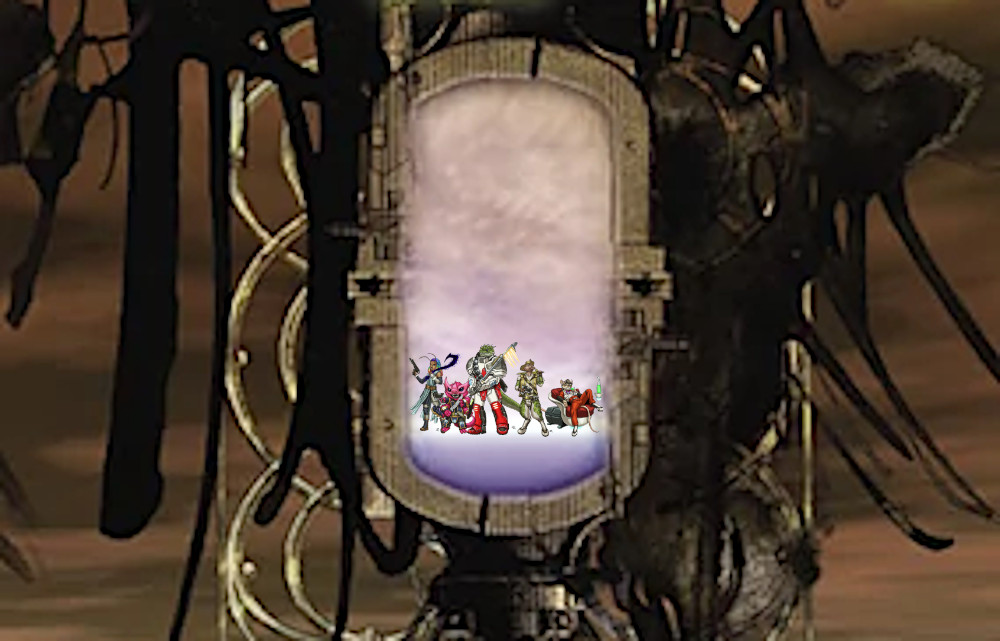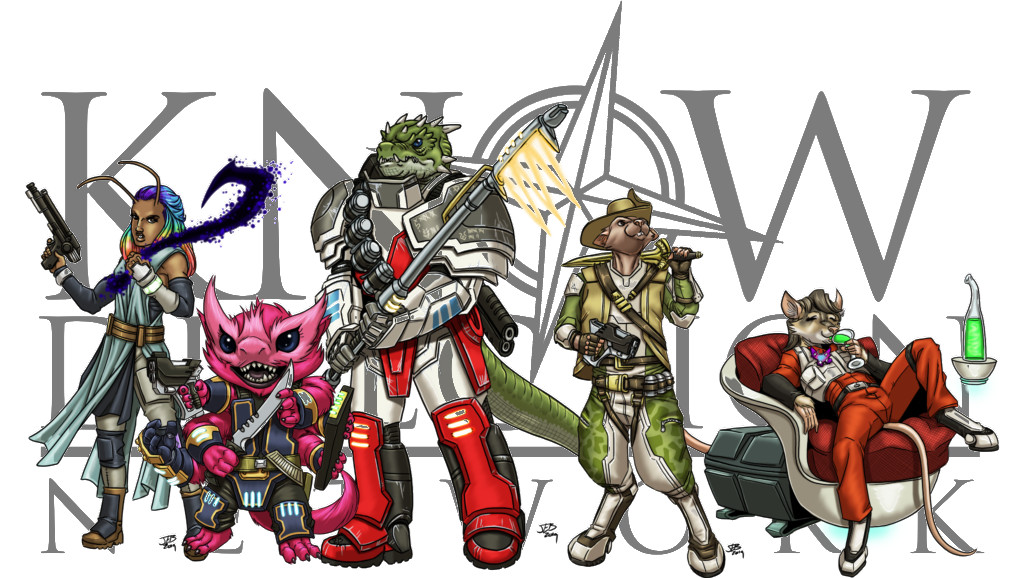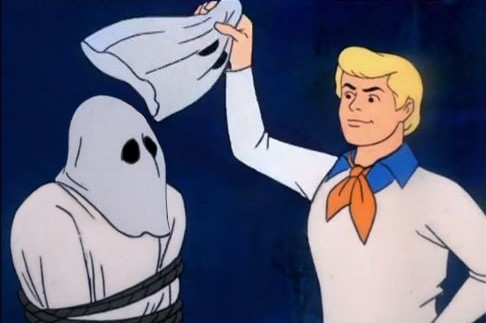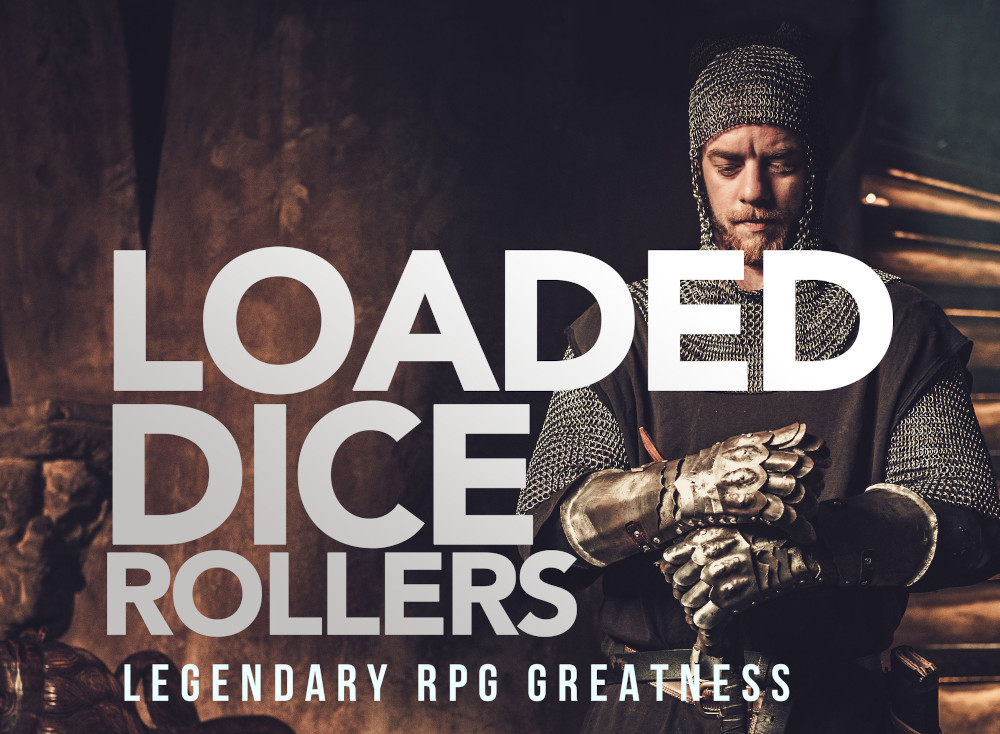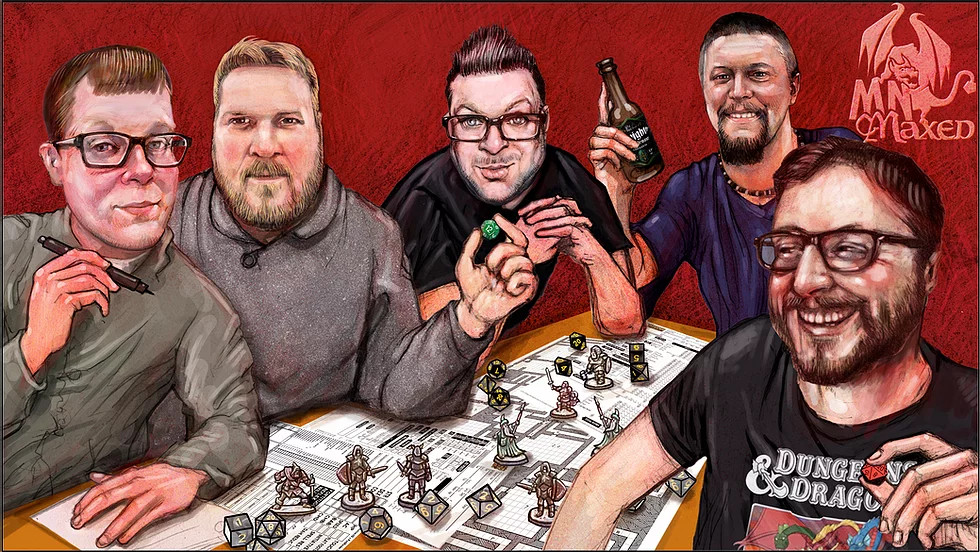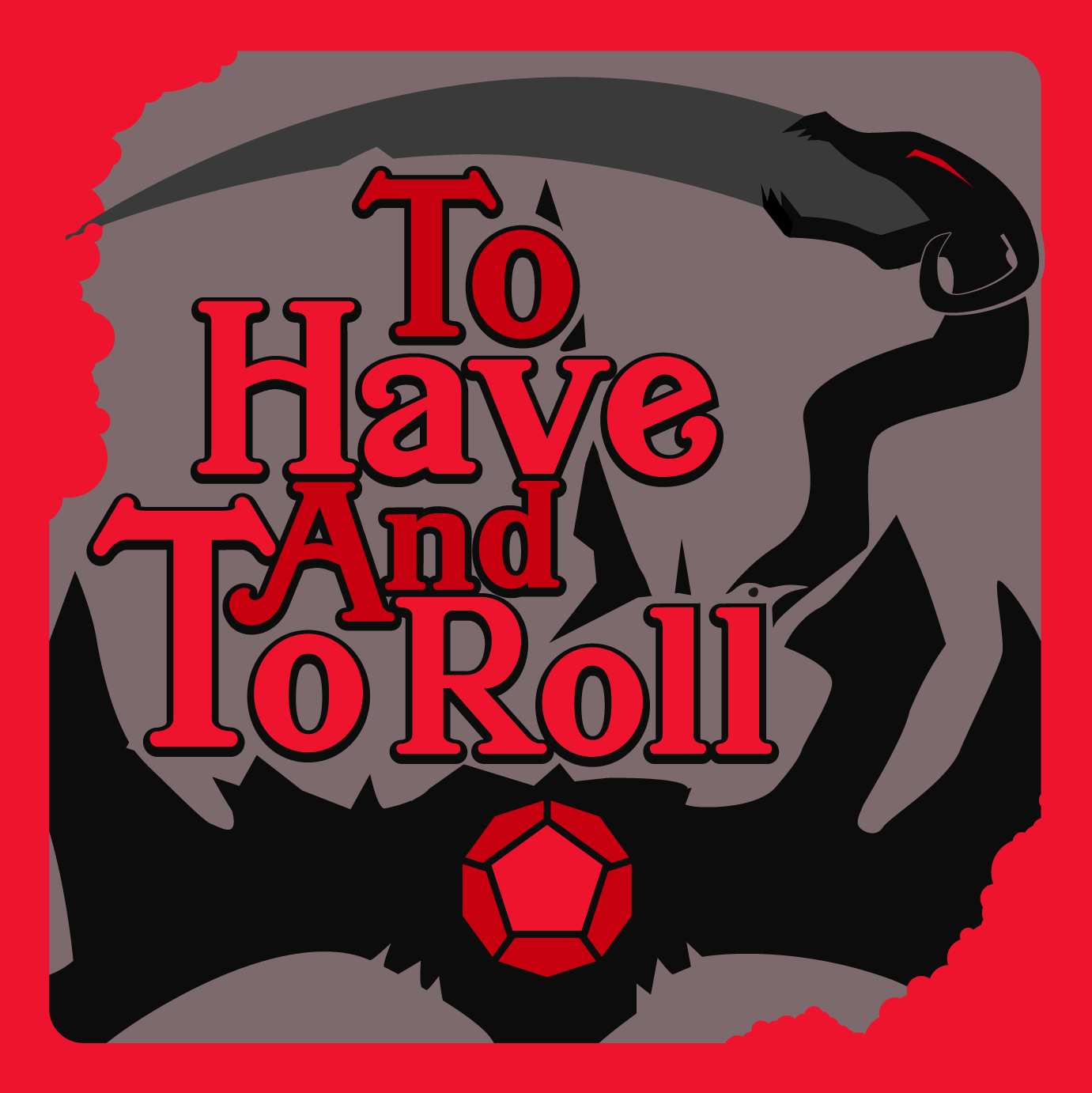Since 2015, the DovahQueen has been taking your questions and giving advice to improve your games. Now the tables are turned in this DovahQueen series; Loren is asking the questions and a panel of guests answers. It’s time to Bend the Knee!
First, let’s meet today’s guests.
Guests – Intrepid Heroes
John Godek
I started playing D&D with the Basic Set in 1979, with Rob Helm (see below) as my very first DM! Early on I enjoyed various TTRPGs such as Gamma World, Traveller, GURPS, Champions, Car Wars, Star Frontiers, and more, but eventually had to stop as I joined the service. I was working odd hours and moving around a lot, making it hard to find a group as well as find time to play. Instead I turned to online games, beginning with Bioware’s Neverwinter Nights, then Diablo II, and finally Guild Wars, where I led the world’s largest guild, was admin for the main Guild Wars fan site, and helped run several international PvP tournaments. Eventually I decided to play games face-to-face again, connecting with Rob and Scott at Free RPG Day. From there we started playing Pathfinder and Starfinder and eventually recruited the rest of the crew. Now I am a 5 Nova Starfinder GM, freelance author, and podcaster on the Know Direction Network. When I am not busy with gaming related activities, I am a business professor in the Seattle area.
Rob Helm
I started RPGs with the Basic D&D box and have been hooked ever since. I’ve spent many years playing in (possibly mythical) sword-and-sandal realms, but I’m enjoying my journey through space opera with Starfinder. My day job involves navigating software licensing rules, so I haven’t the least temptation toward rules lawyering around the table.
Scott Keim
I grew up reading sci-fi and fantasy books. Although I knew D&D existed as a teen, I didn’t start playing until much later, beginning with 3.5 and Pathfinder. My first convention experience was at MegaCon in Orlando in 2012 where I was introduced to Pathfinder Society. This led to me starting PFS at my local game store and attending as many local cons as I could, meeting lots of great people and earning my 3rd GM star. Two years later I applied for and amazingly got a job at Paizo where I’m still working as a Financial Operations Specialist. A surprise to be sure, but a welcome one, leading to even more gaming friendships. Since discovering tabletop RPG’s I have also played many other types of cooperative board and computer games. I’m a crossword and jigsaw puzzle enthusiast, as well as an incorrigible punster!
Ron Lundeen
I’m Stephanie’s husband! We’ve been gaming together for a long time, and I’ve been lucky enough to turn a lot of our fun gaming into fun writing. My first freelance writing assignment was in 1993, but in this millennium most of my freelance writing has been for Paizo Inc. and Wizards of the Coast. I also run my own third-party press, Run Amok Games. Almost four years ago, I made the leap from corporate attorney to full-time Paizo employee and we moved to the Pacific Northwest. I’m now a development manager at Paizo, working with developers and freelancers to create fabulous worlds and monstrous threats so friends can have fun telling stories together. I have lots of advice about being a freelance game designer that I give out in my blog at www.runamokgames.com and on Twitter @RPGRonLundeen.
Stephanie Lundeen
I’ve known Ron Lundeen for over two-thirds of my life and have been playing RPG’s for about that long. Coincidence? Not in the least. But it was when he talked me into spending a New Year’s Eve gaming with a bunch of his buddies that I knew I was hooked—by both him and the game. In addition to participating in Intrepid Heroes, I have played a lot of Pathfinder, have run a couple adventure paths, and have even co-written two of them. In addition to gaming, I edit professionally, aspire to do more writing, and—together with Ron—parent our three high-spirited kids (check out the blog at ouramazingforeverfamily.com).
Mark Woolcott
I play Julakashti on Intrepid Heroes. I have been playing pen and paper RPGs since the early 80’s, starting with D&D and then AD&D. When my friends stopped playing, I thought that the fad had died out until I rediscovered it in 1990 and I have been going strong ever since. I have played with good groups in bad systems and bad groups in good systems and one thing I have learned is that it’s the people and the story that we tell that make the game what it is. I love stories. Whether it’s books, movies/TV, video games, tabletop RPGs, it’s the stories that move me.
About Intrepid Heroes
Intrepid Heroes is an actual play podcast currently finishing up the Dawn of Flame Starfinder adventure path from Paizo. We began playing as a group four years ago, with Scott GMing the Starfinder Dead Suns adventure path. Upon completion of that, we decided to move onto Dawn of Flame, and just for fun try our hand at recording it as an actual play. While we are not professional voice actors or podcasters, we do have a love of the game and extensive knowledge of the rules and setting with very experienced players, GMs, freelance writers, and developers in our group. We are fortunate to have two of the books of the Dawn of Flame adventure path GM’d by their authors; book 4 by our very own Ron Lundeen, and book 6 by Starfinder Developer Jason Tondro. The goal of our actual play podcast is to show a group of friends playing the game, explaining rules, and showing examples of how things might work, so that others might learn and feel comfortable playing and GMing this and other adventures themselves. Intrepid Heroes is posted every other Friday on the Know Direction network.
Today’s Question
“It’s time to put pen to paper, or more likely, it’s time to press keys on the keyboard. Your boss gave you a deadline and its growing closer every day. Writer’s block be damned, you have to submit something. After a stressful day at work, you decide to kick back and relax with your favorite piece of media tonight so that you’ll be suitably ready to start getting this project off your plate first thing tomorrow. Fortunately, as the evening’s chosen entertainment unfolds, a spark of inspiration presents itself. These characters aren’t your favorites without good reason. You enjoy them because they were conceived by ideas that were good, and because they are well-written. You feel like you could use some of the concepts from this medium to help you begin your project tomorrow, and you think you have some ideas to help make your product unique enough as to not feel uninspired. After a nice evening and a nice sleep, you awake the next morning feeling ready to get started.”
Pick one of your favorite fictional characters or settings. What is it and why? If you had to write a new base class based on that character or setting, what kinds of things would that class do that is different than one of the other existing base classes?
John
I am an avid science fiction fan, hence my love for Starfinder. My favorite of the current crop of sci-fi shows is The Expanse. I really enjoy the hard science realism of the setting combined with the deep development of the main characters, all taking place in a complex political environment that causes all kinds of conflict both within the main group as well as between them and outside factions with various agendas. I have often thought of the characters and how I might stat them out for Starfinder. While there does seem to be a good class fit with some, for example Bobbie would be fairly straightforward as a powered armor soldier, the others are less clear. Holden seems has some envoy abilities, but does a lot of soldiering as well. Naomi is a great hacker and you could say she has a magic touch with technological systems, so technomancer would be where I would slot her. Alex flies … and well he is off the show now so probably just best to skip him. Amos … well Amos is my favorite of the bunch and the one I actually tried to make a Starfinder character of, with middling success. Amos Burton, also know as Timmy, has mechanical ability, martial fighting skills, weapons training, and is pretty good at intimidation. In Starfinder terms, one could argue he is a mechanic with strong fighting skills, or a soldier with high intimidate and engineering skills. I think his recently disclosed backstory demonstrates that he is much more than either of these though, so I am suggesting a new class for him – the Troubleshooter.
My idea for the Troubleshooter is that while onboard a starship, the Troublshooter would have sufficient engineering ability to be effective at damage control during starship combat, but not be as good as a mechanic in other engineering related tasks. They can repair things but require explicit directions and instructions on how to make upgrades and improvements to systems. The Troubleshooter would be a full BAB class with CON as their key ability score. They would have Improved Unarmed Strike as a class feature in order to help clean up any trouble they and the crew might get into while the ship was in port, and Percussive Maintenance to assist with damage control while underway. Class abilities of the Troubleshooter would include Improved Improvised Weapon, allowing them to turn mundane items such as toothbrushes, teacups, can openers, and pencils into lethal weapons, Deadpan Taunt, which allows them to bully or demoralize enemies without otherwise negatively shifting their enemies attitude, and Enticing Revelry, which allows them to consume immense amounts of intoxicants without becoming impaired, while simultaneously making them much more effective in social situations.
While the Troubleshooter won’t be better than a soldier in a fight, or more knowledgeable than a mechanic, or as effective socially as an envoy, they will be able to perform fairly well in all three situations, and more importantly will make sure the ship and its crew are always taken looked after.
Rob
I love Charles Stross’s Laundry Files novels about Bob Howard, wizard, secret agent, and IT drudge. Bob spends his time in the field battling extradimensional horrors who often present themselves in the guise of allegedly mythical creatures, while battling software upgrades and suffocating bureaucracy back at the office. The novels beautifully mix science fiction (with shout-outs to computability theory), Cthuhlu mythos, fantasy, and workplace satire. They somehow make all that work every time.
If Bob has a class, it’s Laundry Operative. They are casters, v-e-r-y carefully exploiting hidden powers of the multiverse that will spin their brains into smoothies if they trip up. Their spells let them detect, fend off, and defeat those powers who sneak into our world through cracks in reality. Laundry Operatives also rely on specialized gear, often mundane-looking items powered by an extra-special someone from a nameless dimension.
Every Laundry Operative needs a day job, both for cover and to pad their meager civil service salaries. And class-specific abilities like Repel HR, Soft-Pedal Expense Report, and Distract Supervisor enable them to keep the office hierarchy at bay while they save the world.
Scott
One of the things I like most in my sci-fi and fantasy is exploration and discovery, whether it be new planets or ancient ruins. That is what I love about Jack McDevitt’s Academy and Benedict series of novels, which are set in our universe but contain alien artifacts to be recovered or studied, and mysteries to be solved (or perhaps left unsolved). A few alien cultures exist but they are a rarity and thus each is special no matter their level of development. The characters are simply human scientists, pilots, and others experiencing extraordinary circumstances. Without any superpowers they push themselves to the brink and beyond for the sake of knowledge, adventure, wonder, or the need to understand. They try to piece together the clues of several ancient monuments leading to more mysteries and an oncoming disaster they hope to prevent.
These characters collectively are explorers, archeologists, scientists, all working towards discovery of the new and rediscovery of the old. In Pathfinder they would be delving into ruins for the knowledge buried there. In Starfinder they would be seeking new planets, or look for clues about the Gap. They have more resolve than most and can use it in a wide variety of ways, such as enduring harsh weather or other conditions, stubbornly working on a mysterious artifact, attempting to decipher unknown writing, or continuing on when others give up and turn back. Adaptable and quick-thinking, they use their intellect, experience, and intuition to succeed, only resorting to force when necessary. As such, they have ways to actually defeat opponents using their mental skills rather than just impose penalties or bonuses to attacks.
Ron
I just binged the first season of Loki with my family. It was fine enough, I suppose; my family likes those Marvel television series better than I do. While I don’t think any particular character was compelling enough to build a whole class around, I find the concept of “time police” interesting, and I love the science-fiction trope of characters who can shift themselves and others through time. There was a lot of that in Loki, and they were my favorite parts. Let’s make a class out of that trope, and call it the Timeshifter.
Timeshifters come in two main varieties. First are those who can alter the flow of time for themselves. Maybe they alter the flow of time for everyone other than themselves, putting themselves “out of phase” or “out of time” that results in their being able to move super quickly relative to the rest of the world, but their powers are focused on themselves. Second are those who can alter the flow of time for one other person (or a small group of others), often to rewind a foe to a previous spot in time, freeze them in time in a way that seems like paralysis, or push them ahead to some future spot—maybe an inhospitable and distant one! The Timeshifter class should cater to both of these paths, allowing someone to focus on either the Egoshifter or Foeshifter paths, or to mix-and-match the powers from either to be a little more flexible but a little less focused. Higher-level abilities allow for bigger changes to the flow of time, naturally.
People who jump around through time are generally quick, so this is a Dexterity-focused class. They’re acrobatic and have quick reactions, and aren’t bogged down with armor or heavy weapons. They’re much better fighting with ranged weapons, their fists, or quick melee weapons that make darting attacks, and maybe get multiple attacks more quickly as they advance in the class. Their Reflex saving throw is their best save, and maybe their only good one. They compensate for a lack of armor with a sixth sense about when attacks will strike, allowing them to stutter slightly forward or backward in time to get a boost to their defenses. Many protagonists in time-altering stories are also super smart, able to see time’s intricate connections, so Intelligence also matters to Timeshifters, and maybe determines their time-stuttering defense ability.
There are fantasy tropes about chronomancers and horologists who cast spells, but the Timeshifter isn’t that kind of character. I don’t want to say the Timeshifter casts no spells, because most games already have some time-control spells in them—haste, slow, and time stop are pretty common examples—which the Timeshifter can pick up as abilities rather than as true spells. They’re just limited in how they can use them (on themselves if they’re Egoshifters and on enemies if they’re Foeshifters, of course).
To round out the class, let’s throw in some powers they can choose that affect only objects. These probably aren’t worth building into a whole third variety of Timeshifter (the Stuffshifter?), because who wants to explain that choice? “You control time! Do you control it for yourself or for other people?” “Actually, only for inanimate objects” (*sad trombone noise*) But there are still plenty of neat time-themed, object affecting powers the class should be able to do: corrode or dissolve items by rapidly aging them, or rewind an object’s memory or position (for example, to unlock a lock, unload a loaded gun, or follow the back-path of a murder weapon). These are investigative things, which keeps with the class’s Intelligence focus, so those seem like a nice fit and help fill in some levels without flashier choices.
I think that puts us on some pretty solid footing, and well into design of a whole new class. Who knows what the future will bring for the Timeshifter?
Stephanie
The character that has most recently grabbed my attention—and heart—is the Mandalorian, or rather Mandalorians, from the eponymous series. The badass fighting is always a pleasure, but I also love the way that the story of Mandalore is emerging in bits and pieces, along with the backstory of the title character. There was a genuine zing in meeting the other Mandalorians and finding out how the main character was actually a “zealot” whose personal code was not necessarily what he thought it was. And that final episode of season two? Okay, no spoilers.
For a Mandalorian base class, proficiency with a sweet suit of power armor is obviously the first requirement, and it needs to be an option right out of the gate, including the rocket pack. That could make a pretty substantially overpowered first-level character, so there would have to be some trade-offs, perhaps to hit points or basic stats. I like the idea that a Mandalorian wouldn’t have to be human, even if that’s breaking with canon. As opposed to the soldier or vanguard, though, the Mandalorian would also need a lot of skills for dealing with people. Diplomacy, Bluff, and Intimidate would all be quite necessary. As opposed to being a straight-up bounty hunter, the Mandalorian would also be characterized by either a personal code or an impossible dream. So the character would have an additional advancement track either for achieving that dream or for living by that personal code. Actions that betray the dream or the code would result in penalties or even irreparable damage to the armor. Successes could not only advance the story but also result in unexpected gains like a new weapon proficiency—or perhaps a couple ranks in Mysticism!
Mark
After my umpteenth viewing of The Princess Bride I have decided that Fezzik AKA The Giant would make a great class. An obvious fighter type (unarmed), Fezzik actually spends most of his time influencing people, and while Intelligence may be his dump stat, his good natured Charisma is second only to his massive Strength.
The Giant starts off being able to use his Strength bonus on intimidate checks as a class ability without the need for buying a feat, and will be able to deliver a debuff to opponents with his Rhyming Taunt. As he starts to level up, his superior endurance will come into play as his Endless Climb ability allows him to ignore exhaustion when exerting himself over long periods, even while encumbered. He will be able to extract information from an unwilling character/NPC with Jog His Memory, but if he exceeds the DC by 10 or more, the informant will be rendered unconscious for 1D6 hours.
By the mid-levels, The Giant will gain bonuses when he is in melee with multiple opponents as he gets the Fighting Gangs for Local Charities ability. He will acquire some modest healing ability with Nurse Your Inebriated Friend Back to Health. Finally, I have Come For Your Souls! will give him the ability to incite terror and cause up to 60 foes to run away in fear.

